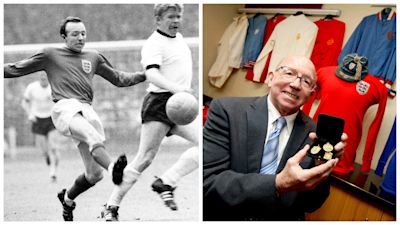Manchester United and England legend Nobby Stiles’ son says football clubs ignoring dementia dangers

Video report by ITV Granda Reports' Sports Correspondent David Chisnall.
The son of the late Manchester United legend Nobby Stiles says it is a disgrace players are made to head footballs in training, accusing clubs of ignoring the link with dementia.
Stiles, who won the World Cup with England in 1966 and the European Cup with United in 1968, had advanced dementia and died in 2020.
A post-mortem revealed his brain was damaged with chronic traumatic encephalopathy.
"It can only be caused by head impact, and the only head impact he ever had was heading the ball," says Stiles' son, John.
"It's horrific. You watch the person you loved go away brutally.
"Dad started losing his memory when he was about 60 and the worst part was when he had this terrible anxiety and we just couldn't calm him.
"To find out that his job had killed him is very powerful for me. I want to make sure ex-players, who are suffering, are looked after and to try to help younger players be aware of the risks."
But, despite writing to all 92 Premier and Football League Clubs, as well as Womens Super League clubs, none have accepted his request for a chance to talk to their players about the risks of heading footballs.
"I don't think football wants to acknowledge the problem. And the problem is real," says John.
"I don't think they care. Perhaps it will damage their brand. I don't know. I'm not telling them not to play football or not to head the ball.
"But no one has ever told footballers about the risks of heading the ball.
"I will write to them all again and I'll start going to training grounds and try to give leaflets out. Every time you head the ball, you're damaging your brain. And we have proof of that."
That proof has come from Professor Willie Stewart's FIELD study, which has found that footballers are up to five times more likely to develop dementia than the general public.
That risk is higher for players in defensive positions, where heading of the ball is more frequent.
Professor Stewart said: "Football is virtually unique in that, to participate in the game, you actually throw your head at the ball.
"If you're hitting your head, your brain is getting microscopic damage every time. We took young people into a lab at Stirling University and had them head the ball 20 times.
"We found that their memory wasn't quite as good and the electrical signal from the brain had slowed down.
"Is it absolutely necessary to head a football in the game? Or could the game be played without heading the football?
"Maybe in amateurs, or at youth level, we can say that heading isn't worth the risk."
But the link between headers and dementia is not new.
Twenty years ago, the coroner at the inquest into the death of Jeff Astle, ruled that heading footballs caused his death. He too had dementia in later life.
"When they got Jeff Astle's diagnosis, clubs should have reduced heading in training. It's a disgrace," John Stiles adds.
"If you look at those two great teams my dad played in - the World Cup in 66 and the European Cup in 68 - his chances of getting dementia should have been 1 in 44.
"It was nearly one in two in those teams. Now imagine that across 92 Football League clubs. The problem is huge and it needs addressing, urgently."
John, who also played football for Leeds and Doncaster, admits he now fears that he will also develop dementia like his father.
For now, he will campaign for a fund to help ex-footballers suffering with the disease, and continue to spread the word about the dangers of heading footballs.